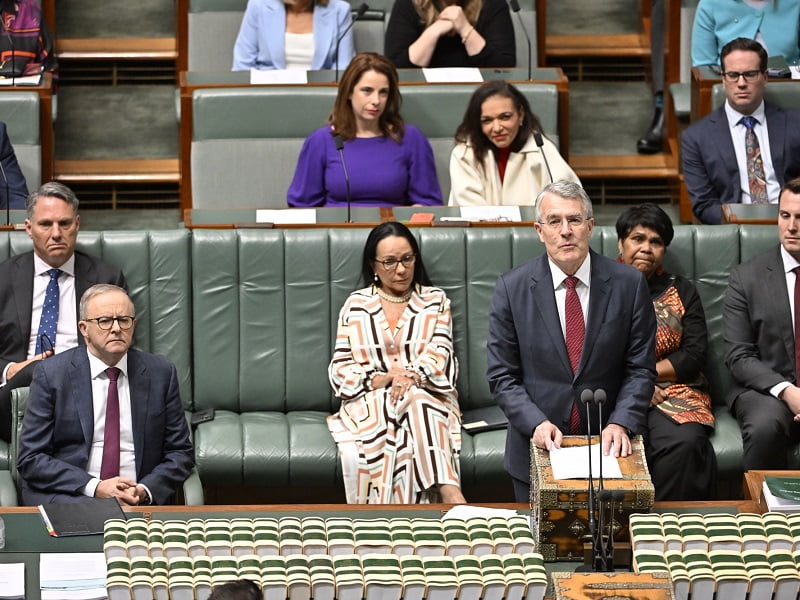The Albanese government has introduced legislation to Parliament that paves the way for Australians to use a digital identity to witness documents online, promising $156 million in time and cost savings each year.
Attorney General Mark Dreyfus introduced the Statutory Declarations Amendment Bill 2023 on Thursday, declaring it an “important milestone in driving the digitisation of government services”.
The bill follows a three-week consultation on the proposal that has been worked up by the Attorney General’s Department, Department of Finance and Services Australia to make declarations and deeds “less cumbersome”.
Commonwealth statutory declarations are currently required to be signed by an individual in the presence of a witness, such as a Justice of the Peace or lawyer, using a paper-based form that been prescribed.
But with more than 3.8 million statutory declarations taking an estimated 9 million hours to complete each year, calls for new digital and hybrid methods have grown louder since the pandemic made e-signatures the norm.
The bill, which follows permanent changes to electronic signatures earlier this week, will introduce a new framework for statutory declarations that include two new options for citizens and businesses to complete statutory declaration, including a new digital method that involves using a digital identity.
The changes are expected to be passed in time for a January 2024 start date, meaning they will come into effect at least six months before laws for an economy-wide expansion of the government’s digital identity scheme.

Unlike tradition methods, a digitally verified statutory declaration will not need to be witnessed, with identify verification through a digital identity provider approved under the Trusted Digital Identity Framework sufficient to satisfy witnessing requirements instead.
“The bill will allow a person to leverage their digital identity to make a statutory declaration end-to-end online on their computer, smartphone or other portable device,” Mr Dreyfus told Parliament on Thursday.
Individuals will, however, need to hold a ‘standard’ or ‘identity proofing level 2/2+’ digital identity through myGovID, requiring two Australian identity documents to be proofed and, in some instances, a face scan.
The bill will also require that evidence of execution is documented by the identity provider, so that if a dispute over the validity of the digitally verified statutory declaration arises, a third-party will be able to access an encrypted digital certificate.
“Through robust technological processes the digital option will negate the need for physical witnessing, while still satisfying the underlying rationale for witnessing requirements,” Mr Dreyfus said introducing the bill.
Technical requirements and conditions will be prescribed by regulations to reflect the “evolving nature of technology and the need for the government to respond quickly to these changes as they arise”, Mr Dreyfus said.
Mr Dreyfus said the economic case for using digital identity for statutory declarations is alone over $156 million in time and cost savings each year, according to modelling commissioned by the Deregulation Taskforce in 2021.
With the government planning to have digital identity laws in place as soon as mid-next year, Mr Dreyfus said myGov and myGovID would initially be the only platforms that will be capable of executing digital declarations.
“At least at first, the government will be able to prescribe myGov as an approved online platform myGovID as an approved identity service able to verify a declarants identity to a prescribe identity level,” he said.
But the government has drafted the bill with the “flexibility to adapt and grow with any expansion of the Australian Government Digital Identity System (AGDIS) to the private sector and states and territories”, noting that it will take a cautious approve to prescribing other providers.
Mr Dreyfus said the bill also contains “number of safeguards to protect Australians personal information and maintain confidence in the framework”, including a requirement that an “approved online platform not retain any copy of a statutory declaration that is made using its service”.
“The approved online platforms will only keep the minimum de-identified data required to verify execution in accordance with the requirement in the bill,” Mr Dreyfus said, adding that “Australian will be able to be confident that the digital option is robust and reliable”.
Online platforms fail to comply can have their approval to provide services revoked. They will also be expected to report to Parliament on the number of statutory declarations through their platforms and if any data breaches have occurred.
“This bill is an important milestone in driving the digitisation of government services. It will deliver a world class simple and secure public service for all Australian,” Mr Dreyfus said introducing the bill to Parliament.

.png?w=600)





